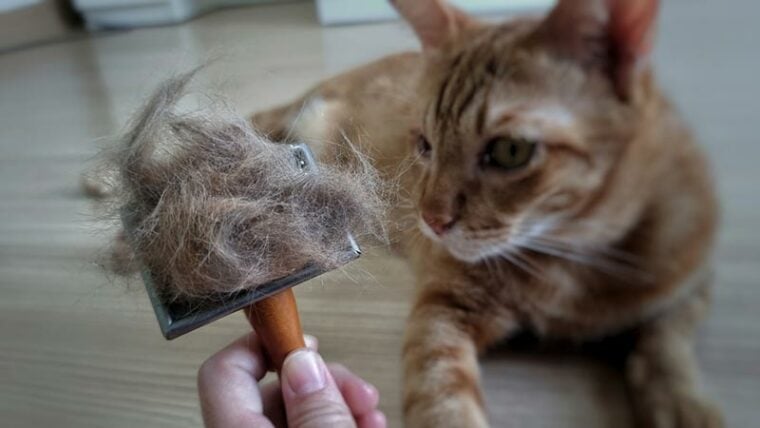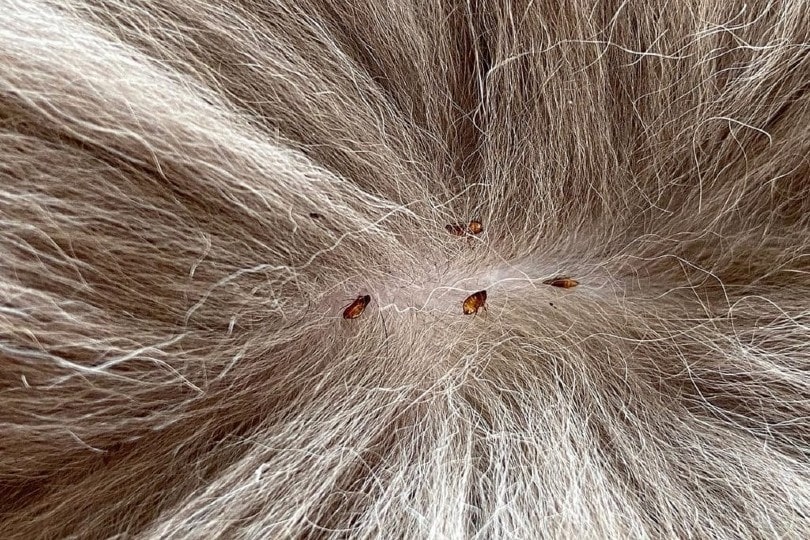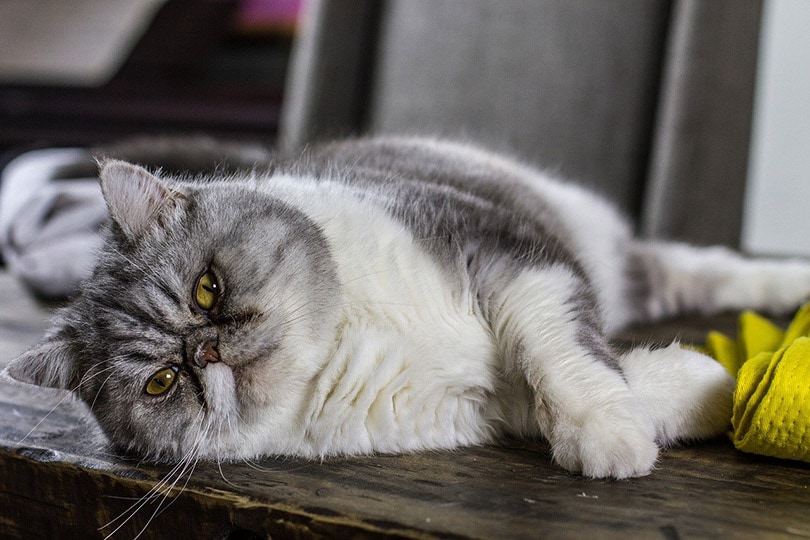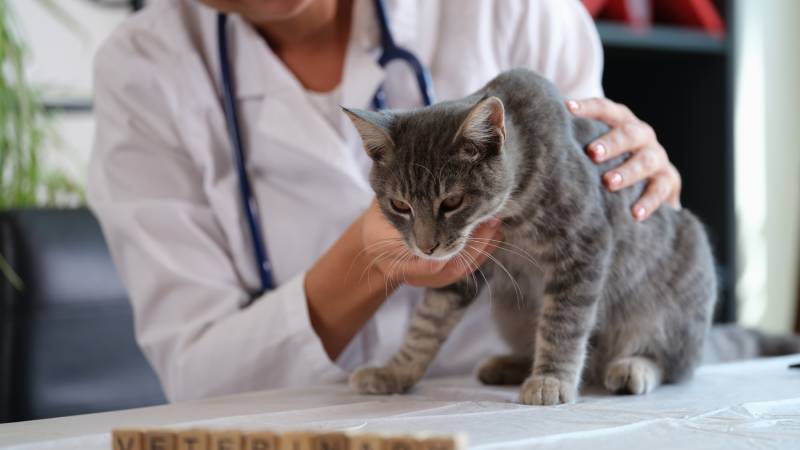
Dealing with a bit of hair on your clothes, furniture, and blankets is part of daily life for a cat parent, especially during warmer seasons. As much as cats spend many hours a day grooming themselves, they do benefit from frequent coat brushings. Regularly brushing your cat will help keep shedding under control, help you better spot skin problems or ticks and fleas, and help spread their natural oils around to keep their coat and skin healthy. The brushing frequency will depend on the breed and coat type. Some cats will need daily brushing, while others can get by with once per week.
A bit of shedding every day is normal, and so is the fact that cats go through two molting seasons a year, when they renew their coats. But if you can’t keep it under control or have noticed a sudden change in the amount of hair your cat sheds and they are not in a molting season, there might be something more serious going on. Here are nine possible reasons that your cat might be shedding a lot all of a sudden.
The 10 Reasons a Cat Is Shedding a Lot All of a Sudden
1. Diet
One of the best ways to tell whether your cat is eating high- or low-quality food is by taking a look at their coat. A poor diet will cause your cat’s hair to look dull, break easily, and shed more. It won’t be soft and silky to the touch, and their skin may become dry and flaky.
Cats need a well-balanced diet containing mostly animal protein and fats and a minimal amount of carbohydrates to thrive. If they’re not getting the nutrition they need through their food, their coats will show this.
Your cat’s food affects the health of your cat. It is worth spending a bit more money on high-quality cat food and cutting costs in another area.

2. Allergies
Allergies can be the main reason that your cat is shedding so much. What’s causing your cat’s allergic reaction can be hard to pinpoint because it could be anything from certain plant pollens or types of foods to dust or the cleaning products you use around your home.
The allergies don’t directly cause the excessive shedding, but they do cause your cat’s skin to itch, which causes them to lick their coats excessively and lose hair. It’s important to take your cat to the vet for a diagnosis so that they can provide you with the best solutions to ease your cat’s discomfort.
3. Parasites
Brushing your cat regularly is the fastest way to pick up on parasites in your cat’s coat. Parasites include fleas, ticks, and mites. Fleas, in particular, are an irritation to cats because they bite their skin to ingest their blood. This causes your cat to scratch their skin. The continuous biting from the fleas may even result in an allergic reaction.
Due to the ongoing scratching, your cat is likely to shed more. If you inspect their skin, you’ll also notice red bites and flea dirt. Bathing and combing your cat will reduce the number of parasites on their body. It’s important to use oral or topical parasite control treatment on your cat, as it’ll kill the parasites when they try to bite into your cat’s skin. You can get this treatment from your vet. Keep in mind that you will also have to treat your entire home to get rid of these pesky parasites.

4. Ringworm
Ringworm isn’t a parasite, but rather a fungal infection. However, it got its name from its circular, red, and scaly appearance when found on humans. Cats experience ringworm slightly differently, as it typically results in a bald spot due to the damage the fungi cause to the hair in the affected area. In some cases, these “spots” can be quite large, and your cat’s hair may look patchy.
Regardless of whether your cat is showing signs, they are contagious to humans and the other pets in your home. Be sure to disinfect all the areas your cat has been around to stop the spread of infection, and give your cat the treatment your vet prescribes for them.
5. Overweight or Obese
A large percentage of cats are considered overweight around the world. As unhealthy and detrimental as it is, it also impacts their coat condition. Overweight cats tend to shed more than healthy cats because they’re unable to groom as well as they should because they can’t reach the different areas of their body.
This leaves their coats looking messy and dull. Without daily grooming, your cat is going to shed more. Take your cat to the vet and discuss a new eating plan to help them lose their unhealthy weight, as that is the primary problem. Secondly, help them with their grooming routine by brushing them daily.

6. Arthritis
Similar to overweight cats, arthritic cats are not as flexible as they once were and find grooming uncomfortable or painful. Without self-grooming, their hair is likely to mat and tangle and fall out over your furniture, surfaces, and clothes.
Arthritis may prevent your cat from grooming themselves frequently, but it can also cause excessive licking. Arthritis causes pain in a cat’s joints and is more common in senior cats. Due to the pain, your cat may lick themselves excessively, which can cause hair loss and bald spots. If you have an older cat struggling with hair loss, get them examined for arthritis.
7. Pregnancy
Pregnancy is all about changing hormones, and these changes can often affect your cat’s hair and make it shed more, especially on her abdomen. The hair sheds in this area to allow her kittens to find her nipples and feed easier. This isn’t the case for all pregnant cats, but it is mostly temporary, and excessive shedding should stop after pregnancy and nursing.
Whether the pregnancy was planned or not, make sure your cat receives the best care throughout this journey. Also, ask for veterinary advice on what to do once her kittens are delivered to ensure they develop correctly.

8. Stress and Anxiety
Many people suffer from anxiety and cats can too. When a cat feels anxious or stressed, they may scratch or groom excessively or stop grooming altogether. Both actions can cause more shedding to occur; the medical term is psychogenic alopecia.
If this is the reason for their increased shedding, you’ll notice other signs too. They’re likely to be more withdrawn than usual, start hiding, become less tolerant, misbehave, show more aggression, or start over- or undereating.
Help your cat feel safe in the home you share together, and think back on all the recent changes that have taken place in your home. Try to remove or adjust anything that might be making your cat feel uncomfortable.
Provide comfort to your cat and show them that they are safe. You can also chat to your vet about calming products to help them cope with the changes.
9. Metabolic Diseases
Metabolic diseases like hyperthyroidism, hypothyroidism, and Cushing disease can cause excessive shedding in cats if they’re left untreated. It affects the whole coat, not just certain areas, and when it is treated, the hair should grow back, and the excessive shedding should stop.
Other signs will accompany hair loss, such as lethargy or hyperactivity, weight gain or loss, dry and flaky skin, excessive thirst, and urination. If you suspect that your cat might have a metabolic disease, you must take them to your vet for a diagnosis and treatment.

10. Other Causes
Certain cancers, such as thymoma, pancreatic carcinoma, and bile duct carcinoma, can cause feline paraneoplastic alopecia, a rare condition that is a sign of internal tumors. Cutaneous lymphoma can also result in excessive shedding. Likewise, the very rare autoimmune disease alopecia areata will cause a cat to lose hair.
How to Prevent Excessive Shedding
If your cat is shedding excessively, the first thing you should do is take them to the vet. A quick visit to a professional can save you a lot of time, worry, and money before you try remedy after remedy. A vet will be able to tell you if your cat has an underlying health issue or if your solution is as simple as changing their diet to something more nutritious.
Helping your cat out with their regular grooming routine by giving them a thorough brush will reduce their shedding. However, if they’re old, overweight, or unable to groom themselves, you’ll need to brush them more often to stop their hair from matting, tangling, and falling out. Make sure to pick the best brush for your cat and their coat type.
You could also consider taking your cat to a groomer for a bath and trim, or you could learn how to do it yourself. Bathing will keep their coat clean and free from dirt and loose hairs. Trimming their coats won’t stop the shedding, but it’ll make the hairs shorter, and it’ll prevent matting if your cat struggles to groom themselves. If you do trim them, keep them inside, especially if it’s cold, and make sure they have a warm bed to sleep in.
If your cat is a breed that naturally sheds a lot, train them to sleep in their own cat bed or cat tree, as these spots are where most of their hair will accumulate, and this is a way to control the amount of hair left around your home.
Tired of cat hair sticking to all of your clothes and furniture?
- ONE PUSH RELEASE - This kitten brush / cat brush pops out fur with just a simple press, leaving you...
- DURABLE - Cat shedding can be a tough ordeal. Made of resilient ABS plastic and metal bristles with...
- COMFORTABLE - A cat fur brush with 60 degree angled, fine bristles and rubber stoppers will bring...
Well, we've got a little secret to share, want to know how we keep shedding to a minimum? The Hepper Cat Brush! Created to be gentle on your cat’s skin while removing excess hair, this brush is perfect for weekly grooming sessions and helping you to put down the lint roller.
At Pet Keen, we’ve admired Hepper for many years and decided to take a controlling ownership interest so that we could benefit from the outstanding designs of this cool cat company!
Conclusion
If your cat’s shedding has suddenly become a lot worse, the reason is usually quite simple, and it has an easy solution. However, it might be an indication of something a bit more serious health-wise. Take your cat for an examination if you can’t determine the cause, and help your cat out by brushing their coat more frequently.
See also:
- Why Cats Shed? How You Can Better Manage the Mess
- My Cat Stopped Grooming: 3 Vet-Reviewed Reasons & Solutions
Featured Image Credit: RJ22, Shutterstock








